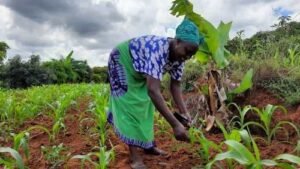Revitalizing Africa’s food system stands as a pivotal endeavor crucial to the continent’s sustainable progress and the welfare of its inhabitants. With Africa witnessing swift population expansion, urbanization trends, and environmental hurdles, the imperative to reshape its food system has intensified. This reshaping involves modernizing agricultural methods, bolstering food security, advocating sustainable farming techniques, and ensuring fair access to nourishing food for all residents. Through the revitalization of Africa’s food system, vast potential emerges for economic advancement, poverty alleviation, environmental preservation, and enhanced livelihoods continent-wide. Within this introduction, we will delve into the primary obstacles confronting Africa’s food system, explore inventive solutions and strategies for transformation, and underscore the significance of collaborative endeavors among governments, entities, and communities to forge a resilient and inclusive food system for the future.
To transform Africa’s Food System, three pathways are available to promote sustainable, inclusive, and scalable progress.
Agriculture’s Vital Role in Sub-Saharan Africa:
Within sub-Saharan Africa, agriculture assumes a central position in shaping the region’s trajectory. As of 2022, it had become the primary employer for over half of the workforce. Despite its pivotal importance, Africa’s food system encounters persistent challenges, including low agricultural yields and the presence of 60% of the world’s untapped arable land. Fragmented value chains, a substantial agricultural finance gap, and limited value addition further impede the sector’s growth potential. Although Africa’s food system holds promise as a driver for inclusive economic development, it currently confronts stagnation.
Challenges to Enhancing Agricultural Resilience in Africa’s Food System:
An obstacle to progress lies in the sector’s insufficient resilience. Over recent years, African farmers and food systems have faced consecutive external shocks, from the global pandemic to geopolitical conflicts. Disruptions in the supply chain, like shortages of fertilizers, have led to reduced yields and worsened food insecurity. Moreover, extreme weather events, such as severe droughts in East Africa, have added pressure on agricultural productivity. Despite attempts to adapt, many smallholder farmers lack the necessary knowledge and resources to adequately tackle these unprecedented challenges.
The Role of Open Capital in Agricultural Development:
In the past decade, Open Capital has engaged in over 450 agriculture and food systems projects throughout Africa, collaborating with various stakeholders including development organizations, foundations, businesses, investors, governments, and farmers. Through this extensive involvement, it has become evident that the sector is at a crucial juncture, where decisions made in the coming years will significantly influence the continent’s future. These decisions have the potential to either drive Africa towards unprecedented development success or risk lagging behind.
Reasons for Optimism of Africa`s Food System:
Despite prevailing challenges, there are reasons for optimism. Forward-thinking approaches are already instigating transformative change in Africa’s food systems. Importantly, both the development community and governments are increasingly acknowledging the pivotal role of the private sector in promoting sustainable development. They are prioritizing solutions that are scalable, financially sustainable, and capable of delivering meaningful impact. We are excited to present three strategies poised to shape the future of agriculture on the continent in the years ahead, particularly if implemented synergistically.
Also visit our site for more information

1. The Role of Open Capital in Agricultural Development of Africa`s Food System:
Over the last decade, Open Capital has been actively engaged in more than 450 agricultural and food systems initiatives across Africa, collaborating with various stakeholders including development organizations, foundations, businesses, investors, governments, and farmers. This extensive involvement underscores the critical juncture at which the agricultural sector finds itself, where decisions made in the coming years will profoundly shape the continent’s trajectory, either towards unprecedented development or the risk of being left behind.
Grounds for Hope:
Despite prevailing challenges, there are reasons for optimism. Forward-thinking strategies are already driving transformative changes in Africa’s food systems. Importantly, both the development community and governments are increasingly acknowledging the pivotal role of the private sector in fostering sustainable development. They are prioritizing solutions that are scalable, financially sustainable, and capable of delivering meaningful impact. Here, we present three strategies poised to guide the future of agriculture on the continent, especially if implemented synergistically.
Rethinking Market Systems:
Leveraging Systems Thinking for Agricultural Development to Revolutionize Africa’s Food System
The adoption of systems thinking has emerged as a powerful catalyst for agricultural development in Africa, reshaping our comprehension of the continent’s food systems. This approach underscores the intricate interdependencies between farmers, markets, consumers, and ecosystem stakeholders, identifying areas where these connections are fragmented.
Challenges and Opportunities:
Despite the promise inherent in this approach, its implementation has been inconsistent and limited. Interventions often lack coordination and overlook critical market linkages, such as providing agricultural inputs without establishing channels for farmers to sell their produce. To revitalize market systems thinking, there must be a fundamental shift in how we approach agricultural development work.
A Path Towards Transformation: Redefining Strategies to Revolutionize Africa’s Food System
Revitalizing market systems thinking necessitates a fundamental change in our approach to agricultural development. This includes adopting a nuanced approach to program design, prioritizing long-term planning, and redefining metrics of success. Moreover, it requires closer collaboration across the development community and with the private sector, breaking down silos to foster greater synergy.
Realizing the Potential:
While the journey towards transformation may seem daunting, our experiences demonstrate its feasibility, particularly when partnering with the private and public sectors. For example, Open Capital recently supported 12 agribusinesses in Uganda through a donor-funded inclusive markets program.
2. Leveraging Climate Finance Opportunities for Agricultural Advancement:
Africa’s food systems face escalating challenges due to climate change, yet they remain under-supported by climate finance. Despite being on the frontlines of climate risks, the agriculture, forestry, and land-use sectors received a mere 3% of global climate financing in 2020. The limited uptake of climate-smart practices exacerbates these challenges, emphasizing the urgent need to unlock climate finance for Africa’s food system.
Highlighting the efficacy of climate-smart interventions is crucial for accessing additional funding. This involves developing tailored approaches that address local contexts and prioritize the needs of stakeholders within Africa’s food system. Collaboration with innovative businesses is essential for scaling impactful solutions to climate change adaptation and mitigation. Encouragingly, positive developments are emerging in this area, with a growing ecosystem of climate-smart donors and businesses across Africa.
Open Capital supports innovative businesses in providing climate change adaptation solutions for Africa’s food system. We forge strategic partnerships and make targeted investments to promote widespread adoption of climate-smart practices and technologies. Our aim is to benefit farmers and agribusinesses continent-wide.
3. Incorporating Technology within Current Frameworks to Transform Africa’s Food System:
- Unleashing Potential through Technology:
Harnessing technology presents a significant opportunity to positively transform African food systems when utilized effectively. Rather than seeking quick solutions, we advocate for integrating both traditional and digital tools to address systemic agricultural challenges.
- A Practical Approach:
This pragmatic strategy involves aligning agricultural technology (agtech) and financial technology (fintech) innovations with existing microfinance institutions, introducing digital marketplaces, and utilizing mobile-based messaging for farmer engagement.
- Innovation at Open Capital:
At Open Capital, our focus lies in designing programs and assessing the commercial viability of agricultural technologies. We partner with global NGOs and innovative agtech companies to create investment opportunities. These focus on technologies that boost productivity and financial access for farmers and agribusinesses.
- Embracing Challenges and Opportunities:
While the path forward may present obstacles, it also offers opportunities for transformative progress in Africa’s agricultural sector. Creative thinking, collaboration, and increased financial backing are crucial for ensuring the continent’s food security.
Our Dedication:
We are steadfast in our commitment to collaborating with clients and stakeholders to realize these objectives and propel sustainable development throughout Africa.


2 thoughts on “Strategies for Sustainable Development in Africa’s Food System”